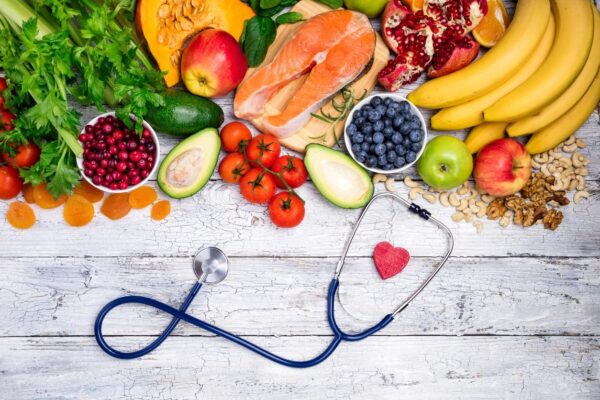
Hormones affect our health physically and mentally throughout our lives, so when there is a major shift during menopause, challenging symptoms arise for most of us. From the well known hot flashes to severe mood changes to joint pain suddenly affecting your quality of life.
Turns out, what you eat has never been more important than during menopause because food affects your body differently when hormones change. Most women don’t know what foods they should be eating, or how to change their habits around their diet on a daily basis.
I’ve pulled together 10 of the best foods to help you feel like you again, and in addition, can also help you figure out ways to slowly incorporate these foods into your diet through my 1:1 Master Menopause Coaching Program.
I’ve created this special 6 session coaching package specifically to help women successfully manage menopause through the 6 pillars of lifestyle medicine while also talking through everything you’re experiencing with me as your support and accountability partner.
Now let’s get to the foods to add to your grocery list…
Berries
This goes for all berries from blueberries to raspberries and strawberries because they’re not only low in calories and high in antioxidants, they can also help combat stress and support heart health during menopause. Tip: go for organic if you can!
Calcium Rich Foods
Bone loss is a big deal during menopause with more than 50% of women experiencing a fracture in their lifetime because of the loss of hormones. Most women don’t even know they have osteoporosis until they’ve had a fracture.
Increasing your calcium and protein intake is essential for bone health. Consider low fat, low sugar/sugar free Greek yogurt, or if you don’t like dairy products, eat plant-based options like dark leafy green vegetables like spinach, collard green or turnips. Oatmeal and tofu are also healthy choices. And if you can’t get enough calcium from foods, consider supplementing.
Fatty Fish
Omega-3 fatty acids are anti-inflammatory and can help alleviate joint pain and believe it or not, mood swings during menopause. Foods like salmon, sardines or mackerel are great choices. If you don’t like fish, eat nuts and seeds like chia seeds, walnuts and flaxseeds. If none of this works for you, consider supplementing with Omega-3 to lower the inflammation in your body.
Vitamin D Foods
This vitamin helps your body absorb calcium and is much needed. Foods rich in Vitamin D are egg yolks, sardines and tuna. You can also buy foods fortified with Vitamin D like some cereals and orange juice.
This is another area where supplementation is important because Vitamin D helps your body function in a magnitude of ways and 80% of women have been found to be deficient when tested.
Leafy Greens
Load up on as many leafy greens as you can everyday, like spinach and kale among others. They not only provide protein, but also a number of vitamins and minerals needed to support your overall health through menopause.
Legumes
Beans, chickpeas and lentils are your friends through life but most especially through menopause. I’ve read that eating beans each day can extend your life 3 years, I’m not sure how true this is, but my takeaway from this is beans are healthy.
They contain fiber, which help with the digestive issues that come about through menopause and are rich in protein helping to keep you full and strong.
Nuts and Seeds
These get their own category in addition to being mentioned with Omega-3 foods because they are the bomb when it comes to menopause, you need them.
Almonds, chia seeds, flaxseeds and walnuts are your best options because they contain healthy fats, phytoestrogens and protein, making them very good choices for women in menopause and thereafter.
Protein
Speaking of protein, it’s been found that most women don’t get enough each day and it should be a priority during menopause. Protein is essential for bone health, hormone production, muscle health and weight management; which are all affected through the menopause transition.
Foods like chicken, fish and turkey are best options because they provide the amino acids for hormone production and maintaining muscle, plus they are lower in saturated fat. If meat is not your thing, refer back to beans as your protein option.
Soy
Turns out soy milk contains phytoestrogens; which are plant-based compounds that mimic estrogen in the body and can alleviate some of the symptoms of menopause like hot flashes and vaginal dryness.
Tempeh and Tofu
Even if you eat meat, consider also eating tempeh; which is a traditional Indonesian food made from fermented soybeans, or tofu, because these plant based protein sources are rich in phytoestrogens that help balance hormone levels naturally.
What NOT to eat during menopause
On a side note, the foods you should stay away from through menopause that have been known to worsen symptoms are processed sugar, like baked goods, processed foods like chips, and salty foods; all of which can also increase the inflammation in your body and play a role in future chronic health conditions.
In addition, limiting alcohol and caffeine will also help with many symptoms of menopause such as anxiety and those pesky hot flashes and night sweats.
Bottom line: what you eat always matters, but even more so during your menopause years and beyond.
Join us at MASTERING MENOPAUSE WITH COACH CRISTINA TO FEEL LIKE YOU AGAIN, our Facebook support group; a space that enables you to connect and learn from like-minded women going through the same challenges, while also providing encouragement to each other and a sense of belonging.





